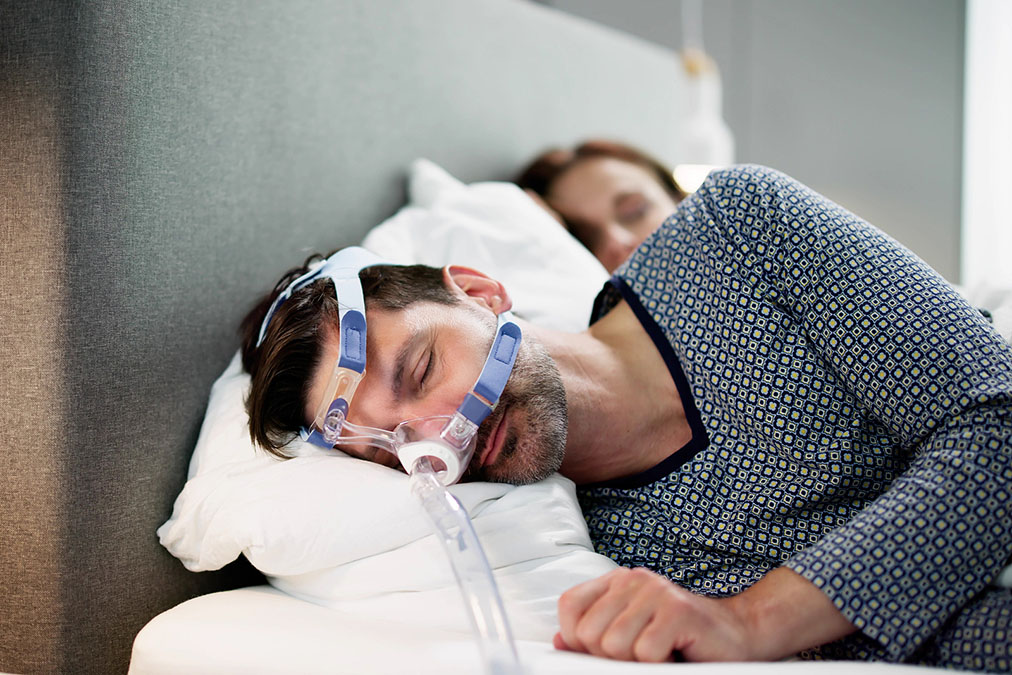 Sleep apnea has been associated with severe health risks such as hypertension, heart failure, cardiovascular diseases, diabetes, and cognitive decline.
Sleep apnea has been associated with severe health risks such as hypertension, heart failure, cardiovascular diseases, diabetes, and cognitive decline.
But a new study published in the journal Sleep reals an even more terrifying effect of sleep apnea.
It accelerates aging at the cellular level. In short, it makes you age more quickly and die sooner.
Because sleep apnea is related to so many health conditions, scientists from the Federal University of São Paulo (UNIFESP) in Brazil wondered whether there was some deeper connection between it and cellular aging.
At the heart of this question are telomeres, structures made of DNA sequences and proteins located at the ends of our chromosomes. Telomeres are crucial for maintaining the genetic material in our cells.
These telomeres naturally shorten as our cells divide to rejuvenate and repair tissues. When telomeres become too short, the aging cells stop dividing, leading to premature cell aging.
Some years ago, the Brazilian scientists showed that sleep apnea could speed up the shortening of telomeres, meaning that sleep apnea could make our cells age faster.
The most common treatment for sleep apnea is continuous positive airway pressure (CPAP). CPAP works by pumping air into the lungs through the nose and mouth during spontaneous breathing. The therapy ensures that the airway remains open during sleep, preventing pauses in breathing.
The Brazilian scientists’ new study’s main goal was to determine whether CPAP could influence the rate of telomere shortening in sleep apnea patients.
They selected 46 male participants aged between 50 and 60, all diagnosed with moderate or severe sleep apnea. They were divided into two groups. One group received the CPAP treatment, and the other received a fake treatment in which the air leached out before reaching their airways.
Over six months, the researchers measured the participants’ telomere lengths and checked other markers of inflammation and oxidative stress.
Their main discovery was that the CPAP treatment slowed the process of telomere shortening.
That wasn’t all they found.
Another significant observation from the study was the role inflammation plays in telomere shortening. The researchers highlighted the connection between sleep apnea and inflammation, particularly focusing on a molecule called tumor necrosis factor alpha (TNF-alpha). TNF-alpha is known to be involved in some inflammatory and autoimmune diseases.
In the placebo group, TNF-alpha influenced telomere length, whereas this association wasn’t seen in the CPAP group. This suggests that CPAP protects us against cell aging by reducing inflammation and its effect on our cells.
The only problem with CPAP is that most people stop using it or take it off in the middle of the night, making it useless.

 Overcoming IBD
Overcoming IBD Multiple Sclerosis
Multiple Sclerosis Banishing Bronchitis
Banishing Bronchitis Gum Disease Gone
Gum Disease Gone Overcoming Onychomycosis
Overcoming Onychomycosis Neuropathy No More
Neuropathy No More The Prostate Protocol
The Prostate Protocol Brain Booster
Brain Booster
 Ironbound
Ironbound
 Solution for Shingles
Solution for Shingles
 The Bone Density Solution
The Bone Density Solution
 The Ultimate Healing Protocol
The Ultimate Healing Protocol
 The Parkinson's Protocol
The Parkinson's Protocol
 The Chronic Kidney Disease Solution
The Chronic Kidney Disease Solution
 Overthrowing Anxiety
Overthrowing Anxiety The Fatty Liver Solution
The Fatty Liver Solution The Hypothyroidism Solution
The Hypothyroidism Solution
 The End of Gout
The End of Gout The Blood Pressure Program
The Blood Pressure Program
 The Oxigized Cholesterol Strategy
The Oxigized Cholesterol Strategy
 Stop Snoring And Sleep Apnea Program
Stop Snoring And Sleep Apnea Program
 The Arthritis Strategy
The Arthritis Strategy The Vertigo & Dizziness Program
The Vertigo & Dizziness Program The 3-Step Diabetes Strategy
The 3-Step Diabetes Strategy Hemorrhoids Healing Protocol
Hemorrhoids Healing Protocol The Erectile Dysfunction Master
The Erectile Dysfunction Master Weight Loss Breeze
Weight Loss Breeze The IBS Program
The IBS Program The Insomnia Program
The Insomnia Program The Migraine and Headache Program
The Migraine and Headache Program The Neck Pain Solution
The Neck Pain Solution The Menopause Solution
The Menopause Solution The Ejaculation Master
The Ejaculation Master The TMJ Solution
The TMJ Solution The Acid Reflux Solution
The Acid Reflux Solution The Fibromyalgia Solution
The Fibromyalgia Solution The Psoriasis Strategy
The Psoriasis Strategy